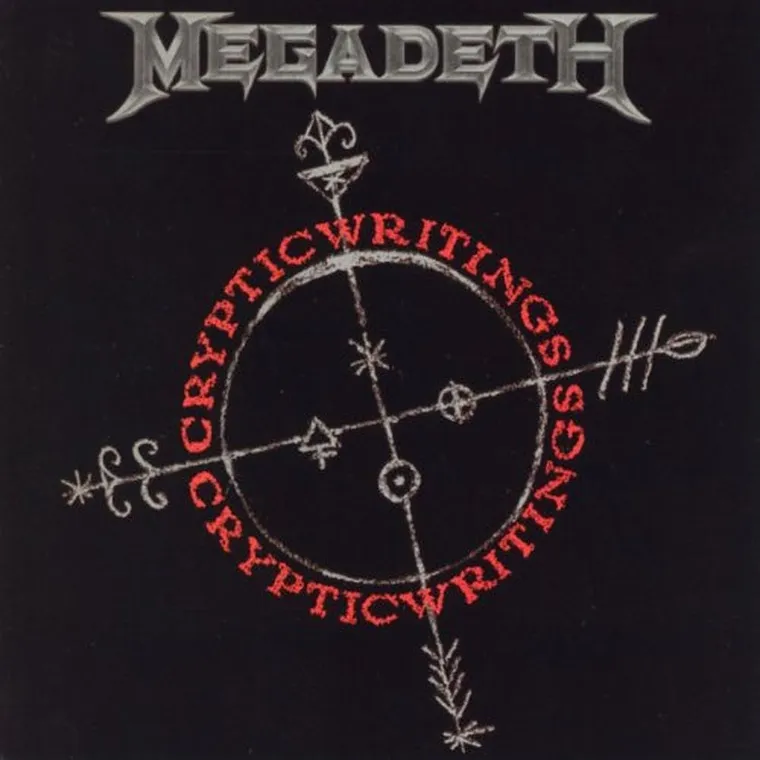Cryptic Writings didn’t erupt with fury—it whispered with precision. Released in 1997, it wasn’t a betrayal of Megadeth’s thrash roots, nor was it a full leap into radio-friendly waters. It was a tightrope walk—controlled, confident, and deceptively dangerous. Where other metal giants leaned into excess or softened for airplay, Megadeth sharpened their hooks and stepped into the shadows.
This was not Rust in Peace. This was not Youthanasia. Cryptic Writings was Megadeth rewriting their language—leaner, smarter, and strangely spiritual.
If Peace Sells was protest and Countdown to Extinction was prophecy, Cryptic Writings was reflection. Not an identity crisis, but a redefinition. A calculated shift in voice, not values.
It wasn’t a sellout.
It was a strategy.
Clarity Through Chaos
The album opens with “Trust,” and it’s a masterstroke. There’s no frenzy, no rapid-fire assault—just a creeping riff, a pulse of tension, and Dave Mustaine’s voice laced with cynicism and sorrow. It’s not metal shouting in rage. It’s metal learning to whisper—and realizing it might be more powerful that way.
“Trust” isn’t aggressive for aggression’s sake. It builds. It coils. By the time the chorus hits, you’re not headbanging—you’re watching your back. It's the sound of paranoia dressed as melody. A hit single, yes—but one rooted in menace, not compromise.
“Almost Honest” follows with groove-laden defiance, as Mustaine trades complexity for clarity. This is Megadeth choosing to be direct—and succeeding. Gone are the dense arrangements of past albums. What remains is tight, lean, and relentlessly catchy. It’s a risk. It’s also brilliant.
Riffs Refined, Not Reduced
Much has been made of Cryptic Writings softening Megadeth’s thrash edges. But "softened" isn’t the right word. This is focused Megadeth. Strategic Megadeth. The riffs haven’t disappeared—they’ve evolved. “Use the Man” blends acoustic layers with a swelling electric payoff that feels almost orchestral in its execution. “The Disintegrators” reminds you that the band hasn’t lost their speed—they’re just choosing when to use it.
There’s no chaos here. There’s control. A band that once chased adrenaline now chases atmosphere. “A Secret Place” is hypnotic and eerie, weaving mysticism and introspection through slow-burning guitars and moody production. It’s the sound of Mustaine looking inward—and daring the listener to follow.
Less Speed, More Substance
The album was recorded during a transitional period—both creatively and culturally. Grunge was fading, nu-metal was rising, and metal bands were being forced to choose between reinvention or irrelevance. Megadeth, never one to follow, chose to adapt without erasing themselves.
“Have Cool, Will Travel” leans into storytelling, with desert-rock swagger and western paranoia. It’s cinematic. It’s weird. It’s addictive. “She-Wolf,” meanwhile, is a full return to form—ripping solos, galloping rhythms, and enough fire to remind you who you’re dealing with.
Then there’s “Vortex”—a track that feels like a storm contained in a jar. Grooves shift beneath Mustaine’s cryptic lyrics, and the solos slice with surgical intent. It’s complex, but not convoluted. It’s tight. Measured. Designed.
Production, Polish, and Precision
Produced by Dann Huff, the album’s sound is clean, but not sterile. Every instrument gets its space. The drums snap. The bass hums with clarity. The guitars are crisp and direct—no clutter, no chaos. It’s a record that values precision over punishment. That alone made it controversial in 1997—but by 2025, it reads like confidence.
Marty Friedman’s guitar work is exceptional throughout—not flashy, not indulgent, just what each song demands. It’s discipline disguised as flair. Nick Menza’s drums are tight and textural, locking in with Ellefson’s bass to ground the entire record in groove-heavy momentum.
And Mustaine? Still venomous. Still bitter. But wiser. Sharper. Less interested in vengeance, more invested in reflection. His lyrics dance between politics, betrayal, faith, and fate—with less rage and more insight.
No Thrash, No Apology
What makes Cryptic Writings enduring is its refusal to be defined by expectations. It’s not here to prove anything. It’s here to explore. “Sin” is melodic doom cloaked in distortion. “Mastermind” struts instead of sprints, playing with vocal phrasing and rhythmic shifts. It’s Megadeth walking sideways when the world expected them to run straight ahead.
This isn’t the heaviest Megadeth record. It’s not meant to be. It’s the most subtle. The most structured. And arguably, the most versatile. It asks you to lean in, not lash out.
Standout Tracks:
- Trust
- She-Wolf
- Use the Man
- A Secret Place
- Vortex
- Almost Honest
A Calculated Rebirth
Cryptic Writings isn’t a statement of rebellion—it’s a thesis of control. In 1997, it confused fans. In 2025, it reads like the blueprint for metal bands navigating the middle ground between evolution and erosion.
This isn’t Megadeth playing it safe. It’s Megadeth sharpening the blade. Less noise. More nuance. No thrash for thrash’s sake—just razor-sharp songwriting, filtered through years of experience, loss, and reinvention.
It’s not the album that changed everything. But it’s the one that proved they could change—and remain unmistakably Megadeth.
Cryptic Writings wasn’t the band’s fall.
It was their pivot. And one of their most important.

